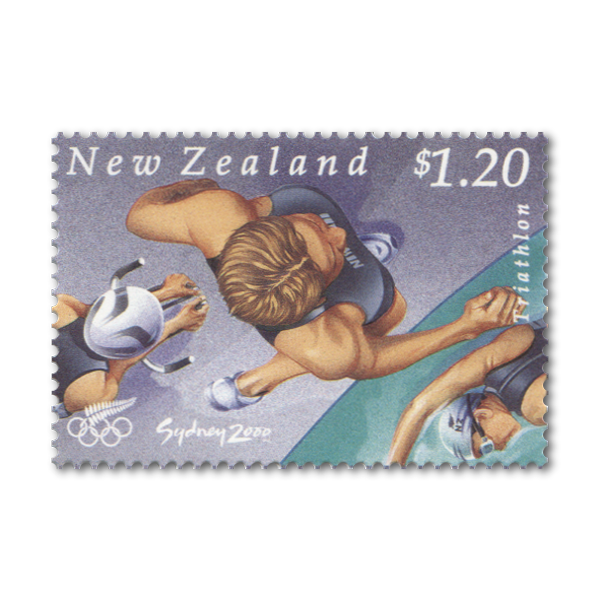As elite athletes from over 200 nations prepared to compete for their countries in the 27th Olympiad in Sydney, Australia, we celebrated our nation of talented, dedictaed and determined sports men and women.
Issue information
To mark this significant sporting event, we released an Olympic & Sporting Pursuits stamp issue that represented four Olympic and two non-Olympic sports played by New Zealanders. The Olympic sports - rowing, equestrian, cycling, and triathlon - have traditionally been successful sports for New Zealanders. All four were selected with the assistance of the New Zealand Olympic Committee.
The Olympic torch journeyed from Olympia, through New Zealand, and spent 100 days travelling around Australia, on its way to Sydney for the opening ceremony of the games on 15 September 2000.
New Zealand's International Sporting Event Success
For a small country, New Zealand has achieved considerable success at international sporting events. New Zealand was not represented at the first three modern Olympiads in Athens 1896, Paris 1900 and St. Louis 1904 due to costs and travels distances. Despite this, New Zealand's Olympic history is rich with memorable sporting moments. The first Olympic medal ever won by a New Zealander was an 'Australasian' representative Harry Kerr won a bronze medal for the 3,500 metres walk in 1908.
Rowing really came into its own for New Zealand at the 1968 Mexico Olympics when the coxed four took the gold medal. New Zealand's success in this Olympic sport has continued since. Equestrian has also been a medal-winning sport for New Zealand - the first in 1984 at the Los Angeles Olympics. The New Zealand equestrian team went on to win team and individual medals at subsequent Olympic Games, including a silver medal in the 1992 three-day event in Barcelona. In that same year, New Zealand cyclist, Gary Anderson, won a bronze in the 4,000 metre individual pursuit.
Bowls and netball have also taken New Zealand to the world stage. Bowls is New Zealand's third largest participation sport - requiring a unique combination of strategy and dexterity, it attracts players of every age and ability. Netball is New Zealand's second most popular sport - having originated in a paddock in the early 1900s, it is now played by more than 12,000 teams throughout the country.
Each of the six stamps in this issue takes a bird's-eye view of these sporting pursuits. Designed with modern simplicity, Martin Bailey of Auckland has captured each sport with vibrant colour and definition, accurately depicting the new Olympic team uniforms. Martin has a long association with New Zealand Post - he also designed the 1992 Barcelona Olympic stamps, the 1994 Beach Cricket booklet and the 1996 New Zealand Symphony Orchestra - 50 years issue.
Product Listing for Olympic & Sporting Pursuits
| Image | Title | Description | Price |
|---|---|---|---|
 |
Single Stamp |
Single 40c 'Rowing' gummed stamp. Rowing is one of the most fiercely competitive inter-school sports in New Zealand and this grassroots competition appears the ideal grounding for future Olympic aspirants. At Olympic level New Zealand has a fine tradition in rowing. The highlight was undoubtedly the achievement in winning a gold medal in the men’s eights, the glamour event of the rowing regatta at the 1972 Games in Munich. New Zealand won its first rowing medal in 1920 at Antwerp, the first year of competition as an independent nation after previously competing as members of the Australasian team. Darcy Hadfield won the bronze in the single sculls events. |
$0.40 |
 |
Single Stamp |
Single 80c 'Equestrian' gummed stamp. Equestrian has also been a medal-winning sport for New Zealand – the first in 1984 at the Los Angeles Olympics. The New Zealand equestrian team went on to win team and individual medals at subsequent Olympic Games, including a silver medal in the 1992 three-day event in Barcelona. In that same year, New Zealand cyclist, Gary Anderson, won a bronze in the 4,000 metre individual pursuit. |
$0.80 |
 |
Single Stamp |
Single $1.10 'Cycling' gummed stamp. There are many contentious issues in the history of Olympic sport and for New Zealand cycling houses one of the most contentious. In the 1972 road race in Munich, New Zealand’s Bruce Biddle finished fourth but was later promoted to third place after the bronze medallist was disqualified for a positive drug test. However Biddle was never awarded a medal and to this day does not appear on a list of New Zealand medallists. New Zealand’s first medal in cycling came in Barcelona in 1992. Wanganui track cyclist Gary Anderson had dominated the track events at the Commonwealth Games in Auckland two years prior and finally made the breakthrough for New Zealand cycling at an Olympic level when he took the bronze medal in the 4,000 metre individual pursuit. |
$1.10 |
 |
Single Stamp |
Single $1.20 'Triathlon' gummed stamp. A combination of swimming, cycling and running, the triathlon is an exacting discipline that only the fittest will complete in. With the phenomenal growth in this relatively new sport in recent years it was perhaps only a matter of time before Olympic officials realised its worth and added it to the Olympic programme. |
$1.20 |
 |
Single Stamp |
Single $1.50 'Bowls' gummed stamp. Bowls is not part of the Olympic Games programme but a mainstay of Commonwealth Games. The game demands an extraordinary eye and a deft touch, split second timing and a keen sense of strategy. Once again, this is a sport where New Zealand has enjoyed considerable success at both world and Commonwealth Games’ levels; more than might have been expected from a country our size. New Zealand has been represented in bowls in 13 Commonwealth Games. In that time, we have won no less than 27 medals, of which nine were gold. An impressive achievement. |
$1.50 |
 |
Single Stamp |
Single $1.80 'Netball' gummed stamp. Netball is New Zealand’s second most popular sport – having originated in a paddock in the early 1900s, it is now played by more than 12,000 teams throughout the country. Though netball is another sport that is not part of the Olympic programme, it made a stunning entry into the Commonwealth Games in Kuala Lumpur in 1998. On that occasion, New Zealand won the silver medal. |
$1.80 |
 |
First Day Cover | First day cover with stamps affixed. Cancelled on the first day of issue. | $7.30 |
 |
Presentation Pack | Presentation pack containing a selection of of stamp products from the issue and further information on the theme of the stamps. | $10.00 |
Technical information
| Date of issue: | 4 August 2000 |
|---|---|
| Number of stamps: | Six |
| Denominations and designs: | 40c Rowing, 80c Equestrian, $1.10 Cycling, $1.20 Triathlon, $1.50 Bowls, and $1.80 Netball |
| Stamps and first day cover designed by: | Martin Bailey of Auckland, New Zealand |
| Printer and process: | Southern Colour Print, Dunedin, New Zealand by offset lithography |
| Number of colours: | Four process colours |
| Stamp size and format: | 41.14mm x 28mm (horizontal) |
| Paper type: | 103 gsm red phosphor stamp paper |
| Number of stamps per sheet: | 50 |
| Perforation gauge: | 14 x 14 |
| Cost of unaddressed first day cover: | $7.30 |
| Special blocks: | Plate/imprint blocks could be obtained by purchasing at least sic stamps from a sheet. Barcode and value blocks could be obtained by purchasing at least two stamps from a sheet. Barcode blocks were available in both A and B formats for sheet stamps. |
| Period of sale: | These stamps remained on sale until 3 August 2001. |

